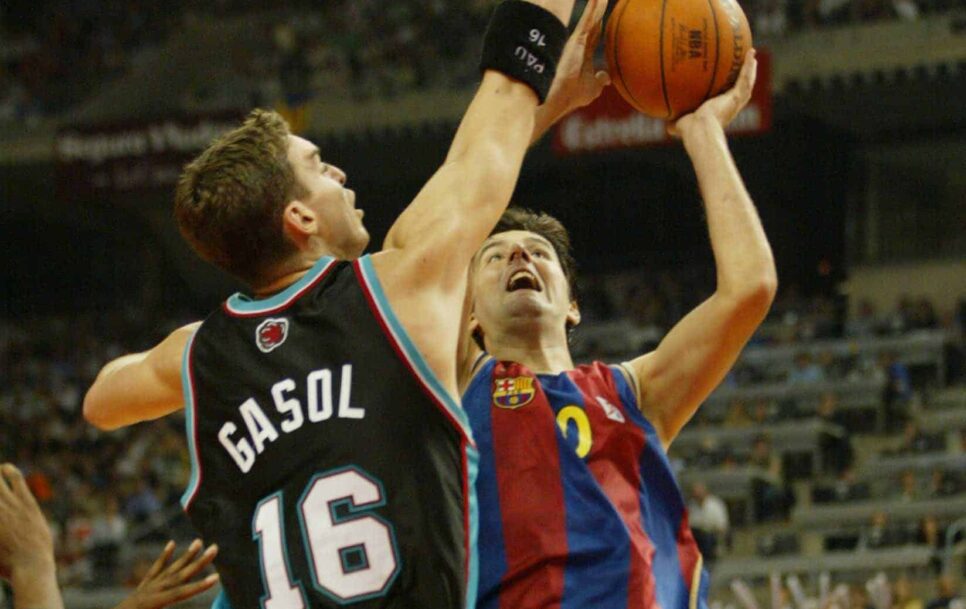No thanks, NBA – Why Dejan Bodiroga opted to be the king of Europe
Sex, drugs and Dejan Bodiroga. That chant echoed through European basketball arenas in the 1990s and the early 2000s when Dejan Bodiroga reigned as the king of European basketball. Although Bodiroga was drafted by the Sacramento Kings in 1995, the Serbian chose to spend his entire career in Europe.
Hailing from the Serbian village of Klek, Bodiroga rose to fame in Italy while playing for Trieste and Olimpia Milano. The forward developed into an all-around offensive player, dazzling fans with flashy moves and a knack for scoring.
Despite being a prolific scorer throughout his career, Bodiroga maintained remarkable efficiency. Take the 1995/96 season, when he played for Olimpia, as an example. Bodiroga averaged 23.3 points during the Italian league’s regular season, shooting 63.8 percent from the field. Although his shooting percentage dipped slightly during the playoffs, he still managed to make 60 percent of his field goal attempts over ten games, including 60.9 percent from beyond the arc.
Doesn’t regret rejecting the NBA
It’s important to note that Bodiroga’s success extended beyond club basketball. He contributed to Yugoslavia winning three European championships, two World Championships, and an Olympic silver medal in 1996 in Atlanta, where Yugoslavia lost the gold medal match to the United States, a team featuring all-time greats David Robinson and John Stockton.
Bodiroga possessed a diverse range of dribble moves and impeccable footwork, enabling him to break down defenders and create space for both himself and his teammates. Like Luka Dončić, Bodiroga didn’t rely on elite athleticism, rather, he emphasized skill over physical prowess.
While he wasn’t an elite defender due to his lack of athleticism and slender frame, he remained a reliable presence on defense. His footwork and lateral quickness allowed him to switch onto guards and maintain a solid defensive stance against larger players.
There’s no doubt that Bodiroga possessed more than enough skill to make an impact in the NBA. He has expressed no regrets about staying in Europe, as he saw no reason to join the NBA solely for the sake of having it on his resume.
Bodiroga has criticized contemporary European players who opt for the NBA. According to him, many pursue the NBA merely to claim they play in the best league on the planet, only to end up spending minimal time on the court before being sent to the G-League.
He opted to be the king of Europe, desiring a significant role and a collection of trophies – both of which he achieved, winning 13 major trophies over his professional career.
Circumstances might have been different had Bodiroga been drafted by a different team or if the Kings had been in a better position in the mid-1990s. While the Kings weren’t dreadful, they weren’t contenders for the championships that Bodiroga so passionately desired. Moreover, Bodiroga mentioned that he couldn’t handle the idea of losing 30 to 40 games a year while continuing his business as usual.
By the time the Kings became respectable and eventually an elite team, it was likely too late for Bodiroga. After all, the early 2000s marked Bodiroga’s peak, and he was busy accumulating three EuroLeague titles. Why would he venture into the uncharted waters of the NBA when he was already the king of Europe and living his dreams?
It’s also worth noting that while some Europeans are lured by the prestige, glamour, and money of the NBA, Bodiroga didn’t care for any of that. He cherished the simple life he led in Europe and continued to earn millions while achieving success, as opposed to earning millions in the face of constant defeat.
By the way, there’s actually a funny story how Bodiroga’s and Kings’ relationship ended. The Serbian retired in 2007 but the Sacramento outfit didn’t renounce his NBA rights until 2017, making him a free agent.
The real Shammgod
Bodiroga isn’t just remembered for his many titles and being one of the all-time European greats. If you type “Dejan Bodiroga” into YouTube’s search bar, one of the first results is a clip from August 2004, when Serbia & Montenegro hosted the USA in a warm-up game before the Athens Olympics. Although the Americans, featuring stars like LeBron James, Tim Duncan, and Allen Iverson, won the matchup 78-60, the game is best remembered for Bodiroga’s impressive dribble move on Richard Jefferson that ended with an and one play.
To European basketball fans, Bodiroga’s move was nothing new; he had used it frequently. In Spanish, the move is called “el látigo,” which translates to “the whip” in English. Nowadays, it’s commonly known as the Shammgod. The name derives from American player God Shammgod, who had a brief stint in the NBA and is a legendary streetball player.
However, European fans have pointed out that Shammgod isn’t the inventor of the move, which involves dribbling to one side of the court before quickly pulling the ball over and changing direction with the other hand. Former players Dragan Kićanović and Danko Cvjetićanin used it back in the day, with Croatian Cvjetićanin considered its creator.
Yet it was Bodiroga who popularized the move in the 1990s. When NBA star Chris Paul performed the move in the 2022 playoffs, he tweeted about pulling off the Shammgod with the move’s creator in attendance. Of course, Paul referred to God Shammgod, which didn’t sit well with some Europeans in the league.
Bogdan Bogdanović responded to Paul’s tweet by saying that the real Shammgod was actually in Belgrade, referring to Bodiroga. Montenegrin big man Nikola Vučević replied to Paul that there is only one Shammgod – Bodiroga.
The Serbian left a lasting legacy on the court and isn’t done making an impact in basketball. Bodiroga is now the president of Euroleague Basketball, which runs and operates the EuroLeague.






